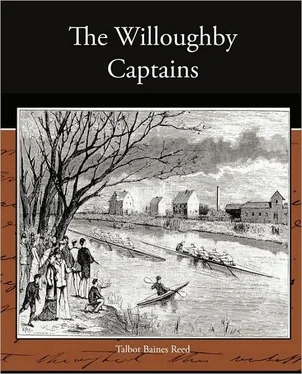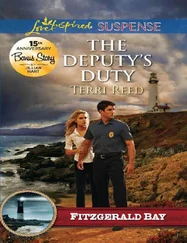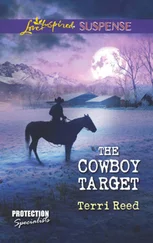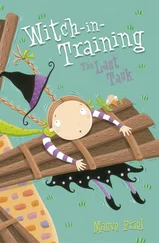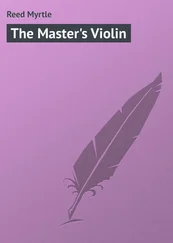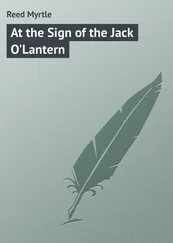However, Parretts, who went in first, began better than any one expected. Parson and King went boldly — not to say rashly — to work from the outset, and knocked the bowling about considerably before a lucky ball from Philpot got round the bat of the former and demolished his wicket.
Wakefield followed, and he too managed to put a few runs together; but as soon as his wicket fell a dismal quarter of an hour followed for the Parretts. Boy after boy, in all the finery of spotless flannel and pads and gloves, swaggered up to the wicket, and, after taking “middle” in magnificent style, and giving a lordly glance round the field, as though to select the best point for placing their strokes, lifted their bats miserably at the first ball that came, and had no chance of lifting it at another.
It was a melancholy spectacle, and far more calculated to excite pity than amusement. Bloomfield chafed and growled for some time, and then, unable to stand it any longer, went off in disgust, leaving the young reprobates to their fate.
Scarcely less remarkable than the collapse of Parrett’s was the steadiness of Welch’s in the field. Although they had little to do, they did what there was to do neatly and well, and, unlike many junior elevens, did it quietly. The junior matches at Willoughby had usually been more famous for noise than cricket, but on this occasion the order of things was reversed, and Riddell, as he looked on and heard the compliments from all quarters bestowed on his young heroes, might be excused if he felt rewarded for all the labour and patience of the past month.
It offended him not at all to hear this good result attributed generally to Mr Parrett’s instructions. He knew it was true. Mr Parrett himself took care to disclaim any but a small amount of merit in the matter.
“It’s a wonder to me,” said he to Fairbairn, in the hearing of a good many seniors, who were wont to treat anything he had to say on athletic matters as authoritative—“it’s a wonder to me how Riddell, who is only a moderate player himself, has turned out such a first-rate eleven. He’s about the best cricket coach we have had, and I have seen several in my time. He has worked on their enthusiasm without stint, and next best to that, he has not so much hammered into them what they ought to do, as he has hammered out of them what they ought not to do. Three fellows out of five never think of that.”
“I’m sure they don’t,” said Fairbairn.
“See how steady they were all the innings, too!” continued Mr Parrett. “Three coaches out of five wouldn’t lay that down as the first rule of cricket; but it is, especially with youngsters. Be steady first, and be expert next. That’s the right order, and Riddell has discovered it. I would even back a steady eleven of moderate players against a rickety eleven of good ones. In fact, a boy can’t be a cricketer at all, or anything else, unless he’s steady. Now, you see, unless I am mistaken, they will give quite as good an account of themselves at the wickets as they did on the field.”
And off strolled the honest Mr Parrett, bat in hand, to umpire, leaving his hearers not a little impressed with the force of his views on the first principles of cricket.
The master’s prophecy was correct. The Welchers, notwithstanding the fact that they had only twenty-five runs to get to equal their rivals’ first innings, played a steady and careful innings, in which they just trebled the Parretts’ score. The bowling against them was not strong certainly, but they took no liberties with it. Indeed, both the captain and Mr Parrett had so ruthlessly denounced and snubbed anything like “fancy hitting,” that their batting was inclined to err on the side of the over-cautious, and more runs might doubtless have been made by a little freer swing of the bats. However, the authorities were well satisfied. Cusack carried his bat for eighteen, much to his own gratification; and of his companions, Pilbury, Philpot, and Walker each made double figures.
It required all Riddell’s authority, in the face of this splendid achievement, to keep his men from jeopardising their second innings in the field by yielding prematurely to elation.
“For goodness’ sake don’t hulloa till you’re out of the wood!” he said; “they may catch up on you yet. Seventy-five isn’t such a big score after all. If you don’t look out you’ll muddle your chance away, and then how small you’ll look!”
With such advice to hold them in check, they went out as soberly as before to field, and devoted their whole energies to the task of disposing of their enemies’ wickets for the fewest possible runs.
And they succeeded quite as well as before. Indeed, the second innings of the Parretts was a feeble imitation of their first melancholy performance. Parson, King, and Wakefield were the only three who made any stand, and even they fared worse than before. All the side could put together was twenty-one runs, and about this, even, they had great trouble.
When it became known that the Welchers had won the match by an innings and twenty-nine runs, great was the amazement of all Willoughby, and greater still was the mortification of the unlucky Parretts. No more was said about the grand concert in which they intended to celebrate their triumph. They evidently felt they had not much to be proud of, and, consequently, avoiding a public entry into their house, they slunk in quietly, and, shutting out the distant sounds of revelry and rejoicing in the victorious house, mingled their tears over a sympathetic pot of tea, to which even Telson was not invited.
Chapter Thirty Two
A Climax to Everything
Among the few Willoughbites who took no interest at all in the juniors’ match was Gilks.
It was hardly to be wondered at that he, a schoolhouse boy, should not concern himself much about a contest between the fags of Welch’s and Parrett’s. And yet, if truth were known, it would have been just the same had the match been the greatest event of the season, for Gilks, from some cause or other, was in no condition to care about anything.
He wandered about listlessly that afternoon, avoiding the crowded Big, and bending his steps rather to the unfrequented meadows by the river. What he was thinking about as he paced along none of the very few boys who met him that afternoon could guess, but that it was nothing pleasant was very evident.
At the beginning of this very term Gilks had been one of the noisiest and liveliest fellows in Willoughby. Although his principles had never been lofty, his spirits always used to be excellent, and those who knew him best could scarcely recognise now in the anxious, spiritless monitor the companion whose shout and laugh had been so familiar only a few months ago.
Among those who met him this afternoon was Wibberly. Wibberly, like Gilks, felt very little interest in the juniors’ match. He was one of the small party who yesterday had come in for such a smart snubbing from Bloomfield, and the only way to show his sense of the ingratitude of such treatment, especially towards an old toady like himself, was to profess no interest in an event which was notoriously interesting the Parretts’ captain.
So Wibberly strolled down that afternoon to the river, and naturally met Gilks.
The two were not by any means chums — indeed, they were scarcely to be called friends. But they had one considerable bond of sympathy in a common dislike for the schoolhouse, and still more for Riddell. Gilks, as the reader knows, was anything but a loyal schoolhouse man, and ever since he became a monitor had cast in his lot with the rival house. So that he was generally considered, and considered himself to be, quite as much of a Parrett as a “schoolhouser.”
“So you are not down looking at the little boys?” said Wibberly.
Читать дальше
